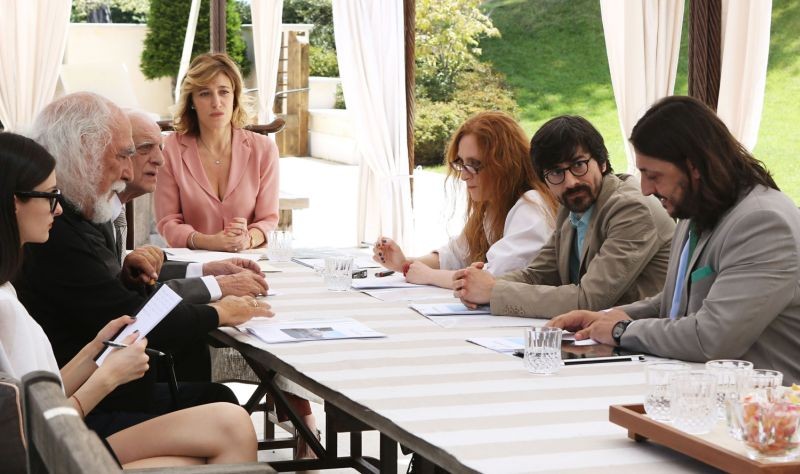A terrific comic melodrama about the way we live now, Italian style, HUMAN CAPITAL continues the reign of Paolo Virzi as one of, if not the Italian master at capturing his country's life in all its complexities, humor and sadness. This multi award-winning filmmaker has here co-adapted the screenplay (based on the novel by Stephen Amidon) and directed this sleek and highly entertaining tale of Italy's very rich and those who aspire to that class. In the process Virzi looks at the wealthy, the bourgeoisie, and the underclass and the ways in which they connect and bounce off each other -- sometimes comically, at other times violently, and always somehow thoughtlessly, as each strives to "succeed."
Signore Virzi (shown at left) -- whose films, from My Name Is Tanino and Caterina in the Big City to The First Beautiful Thing and Every Blessed Day, have given me immense pleasure over the past decade or so -- comes through again with another good one. If I call Human Capital a melodrama, I mean no disrespect, for a very good melodrama is a rare thing these days, and this proves a fine and comic one, as it dissects class and wealth, attitudes and actions that lead to (and from) the hit-and-run accident that begins this stylish and engaging film. Once we see that initial accident, Virzi circles back to show us -- from several viewpoints -- what has happened and why. Each perspective from which we view things gives us greater scope and understanding, until all the pieces of the mystery at last connect.
The characters here include a wealthy family -- husband (Fabrizio Gifuni, above, right), wife (Valeria Bruni-Tedeschi, above, left) and spoiled son -- and the very middle-class family, the daughter of which happens to be the girlfriend of the rich son.
That bourgeois dad, played with magnificent cluelessness by Fabrizio Bentivoglio (above, left) -- his wife (Valeria Golino, above, right) proves much more stable and intelligent -- pushes himself into being allowed to invest in one of the wealthy husband's latest schemes (a talent for tennis provides his entryway), and we're off to the races.
The movie's pivotal event is an awards dinner to honor one of the students (the rich man's son is in the running), at which the victim of the accident -- an immigrant waiter (shown in background, above) -- happens to be working. One of the movie's great pleasures comes from the fact that the more we learn, the more things change from what we'd first imagined.
The movie takes some clever and interesting side trips, too, the best being the rich wife's involvement with a soon-to-be-torn-down theater that she decides to "champion," using her husband's money (of course), gathering together a fancy Board of Directors (above, in one of the film's most caustic scenes), and then getting sexually involved with one of the board members (Luigi Lo Cascio, below, right).
The theater surfaces later in a crackpot blackmail scheme, as the finale races toward us and the involvement of the bourgeois daughter (Matilde Gioli, below, right, with Giovanni Anzaldo, who, along with that hit-and-run waiter, represents the lower classes) becomes more central. I do wish the filmmaker had not resorted to the by-now old-hat routine of someone reading someone else's email (this is the modern version of Downton Abbey's surreptitiously overheard conversations). But then, that's one of the things that separates drama from melodrama.
Overall, however, Human Capital proves a feisty, lusty look at Italy under the economic gun, struggling to "achieve," no matter what the cost. (We learn, during the end credits, exactly to what the movie's title refers.)
From Film Movement, in Italian with English subtitles, and running 110 minutes, the movie opens this coming Wednesday, January 14, in New York City at Film Forum and in Los Angeles on Friday, January 16, at the Sundance Sunset Cinema. You can view all currently playdates, with cities and theaters listed, by clicking here and scrolling down.













No comments:
Post a Comment